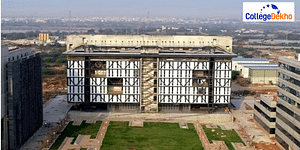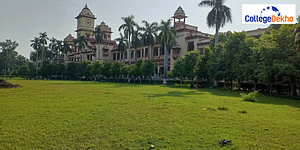BSc Course: Full Form, Admission 2024, Entrance Exam, Syllabus, Top Colleges, Fees, Career Scope
BSc course offers diverse specialisations like Physics, Chemistry, Biology, and Computer Science. The 3-year course equips students with a strong foundation, with job opportunities offering average salaries ranging from INR 2.5-7 LPA.
Table of Contents
BSc Course
A BSc course is a three-year undergraduate program focusing on core scientific principles, theories, and methodologies. It allows students to specialise in fields like Biotechnology, Microbiology, Zoology, Botany, Information Technology, Psychology, Economics, and more.
BSc eligibility in India typically requires students to have passed Class 12 with subjects like Physics, Chemistry, and Biology/Mathematics (PCB/M). Admissions are often based on Class 12 aggregate scores, but some top BSc collegesalso accept entrance exam scores from tests like CUET, ICAR AIEEA, MHT CET, KCET, and others.
Fees of BSc in government college and private college vary significantly, ranging between INR 10,000 and INR 1.95 LPA. Graduates can explore diverse job roles such as Research Scientist, Clinical Research Specialist, Lab Technician, Biotechnologist, Assistant Professor, Journalist, and more.
The scope after a BSc course is in fields like research, education, healthcare, and technology. Depending on their specialisation, BSc course salary ranges from INR 3.8 to INR 8 LPA, with opportunities for higher earnings as they gain experience and expertise.
BSc Course Highlights
Given below are the most significant BSc course details after 12th.
| Full Form | Bachelor of Science |
|---|---|
| Course Level | Bachelors |
| Courses Offered | BSc Physics, BSc Nursing, BSc Computer Science, BSc Geography, BSc IT, BSc Biology, BSc Forensic Science, etc. |
| BSc Course Duration | 3 years |
| Type of Examination | Semester-wise/yearly |
| BSc Course Eligibility Criteria | Class 12th Board exams with a 50% aggregate mark in the science stream. |
| BSc Course Admission Process | Based on: - Merit List - Entrance Exams |
| BSc Course Average Fees | INR 10K - 1.95 LPA |
| BSc Course Average Salary | INR 3.80–INR 8 LPA |
| Top Colleges | Delhi University, Madras Christian College, Christ University, Stella Maris College, Presidency University, etc. |
| Entrance Exams | CUET, OUAT, Rajasthan JET, NPAT, and SUAT |
| Careers Scope | Candidates can either pursue a master's degree or work in specialisation-specific jobs. |
| Jobs Opportunity | Scientist, Research Associate, Teacher, Professor, Lab Chemist, Statistician, etc. |
Why Choose a BSc Course?
Choosing which course to graduate in depends on a student’s passion, career direction, and interests. If they are inclined towards a BSc course, they must have a knack for scientific principles, explanations, and the functioning of it. The in-depth reasons why students choose BSc course are given below:
Variety of Specialisations
The BSc degree provides access to more than 10 kinds of specialisations. These include Microbiology, Information Technology, Economics, Nursing, Zoology, Botany, etc. Students can opt for a particular specialisation based on their interests. For example, if biology, environment, and related fields interest them, they can opt for microbiology, botany, etc. If they are inclined towards computers and IT, Information Technology, Data Science, and other specialisations become available.
Skill-Oriented Courses
The Bachelor of Science aims to inculcate scientific, technical, critical thinking, and analytical skills. Through these skills, vast career opportunities also come up for people. Since the landscape for jobs changes, BSc graduates can easily adapt to these changes. Thus course lays the foundation for advanced degrees and opportunities.
Higher Education Options
Candidates who enter into BSc courses open themselves to many higher education options. MSc, PhD, and related fields are open for students to advance in their education and career fields. The fundamentals are strongly worked on in BSc graduation and paves way to build up on it in postgraduation and advanced studies.
Vast Career Options
With advanced education and skills, candidates can choose from many career options. Many BSc graduates go into teaching. Others may choose research analysis, technical writing, information technology, healthcare, pharmaceutical, research, agriculture, and more. Some common job profiles for BSc graduates include lecturer, research analysts, chemical engineer, IT engineer, chemist, etc.
BSc Course Admission Process in India
The BSc admission process in India is designed to accommodate diverse educational pathways, offering options for merit-based selection and entrance exams. Understanding the process is crucial to ensure a smooth application experience and secure admission to a preferred institution. Below is an overview of merit-based and entrance exam-based BSc admissions in India.
BSc Application Form
Candidates interested in pursuing a BSc degree should research colleges and universities offering the desired program and complete the application form for their preferred institution. The details typically required in the application form include:
- Personal Information: Name, address, date of birth, etc.
- Educational Qualifications: Class 10 and Class 12 marks.
- Entrance Exam Details: Scores and rank (if applying through an entrance exam).
- Additional Information: Category certificates (if applicable) and other relevant details.
- Document Submission: Upload or attach necessary documents such as mark sheets, certificates, ID proof, etc.
BSc Course Eligibility Criteria
The eligibility criteria for the BSc course are available below:
| Admission Type | Eligibility Criteria | Additional Details |
|---|---|---|
| Merit-Based Admission | Minimum 50% aggregate marks in Class 12 qualifying exams (varies by institution). | Selection based on university-specific cutoff scores. May include an interview or group discussion. |
| Entrance Exam Admission | Minimum qualifying marks in Class 12 as specified by the institution. | Performance in the entrance exam is the primary selection criterion. |
| Stream Requirement | Science stream in Class 12 with subjects like Physics, Chemistry, Biology, and/or Mathematics. | Specific subject combinations may be required depending on the BSc specialisation. |
| Age Limit | Some institutions may have an upper age limit for admission (commonly 22–25 years for the general category). | Relaxation in age criteria for reserved categories may apply. |
BSc Course Entrance Exams
For BSc admission, various colleges and universities hold an entrance exam. The following is a list of BSc entrance exams required for admission to this course, along with their descriptions:
| List of BSc Entrance Exams | Exam Date | Description |
|---|---|---|
| CUET | Third week of May 2025 | The Central University Entrance Test (CUET) will give students a single-window opportunity to apply to these participating universities/institutes across the nation for admission to various BSc programs of the participating Central Universities. Class 12th results will not be considered during admissions to undergraduate programs at Central Universities; admission will solely be based on CUET scores. |
| OUAT | 3rd week of June | For admission to the undergraduate level, the University of Agriculture and Technology of Orissa (OUAT) holds an annual examination. |
| Rajasthan JET | 1st week of June | Rajasthan JET is a state-level joint entrance exam held in Rajasthan for admission to BSc Agriculture (Hons), BSc Horticulture (Hons), and BSc Forestry (Hons). |
| NPAT | 1st week of January 2025 to 4th week of May 2025 | NPAT, or NMIMS Program, is an entrance exam for admission to BSc courses such as BSc (Finance), and BSc (Economics). |
| SUAT | June 2025 | The SUAT (Sharda University Admission Test) is administered by Sharda University, Greater Noida, for undergraduate and postgraduate admissions. |
| Presidency University Bachelor Degree Entrance Test (PUBDET) | July 2025 | To select candidates for admission to BSc (honours) programs offered at Presidency University, Kolkata, the West Bengal Joint Entrance Examinations Board (WBJEEB) administers the Presidency University Bachelor's Degree Entrance Test (PUBDET). |
BSc Counselling
Colleges and universities where students have applied may invite candidates who meet the required cutoff marks for counselling sessions or interviews, depending on the institution's admission process. These sessions help finalise the selection of eligible candidates.
BSc Seat Allotment
Admission to BSc courses is granted based on the candidate's merit or scores obtained in the entrance exam. After receiving a seat allotment, candidates must pay the seat acceptance fee within the specified time to confirm their admission. They must also submit the necessary documents for verification and deposit the remaining fee to complete the admission process.
BSc Direct Admission Without Entrance Exam
Many colleges in India offer direct admission to BSc courses without the requirement of an entrance exam. For direct BSc course admission in India after 12th, candidates must meet the eligibility criteria and follow the same steps for counselling and seat allotment, excluding the entrance exam process.
Top BSc Colleges In India
Students who want to pursue a BSc should look for admission to the following top colleges:
| State | College Name | City | Fees Range (INR) | Specialisations |
|---|---|---|---|---|
| Delhi | Miranda House | Delhi | 59,400 | Physics, Chemistry, Zoology, Botany, Mathematics |
| Delhi | Hindu College | Delhi | 29,470 | Chemistry, Physics, Statistics, Botany |
| Delhi | St. Stephen’s College | Delhi | 24,850 | Mathematics, Physics, Chemistry |
| West Bengal | St. Xavier’s College | Kolkata | 60,500 | Life Science, Biotechnology, IT |
| Delhi | Hansraj College | Delhi | 45,000 | Computer Science, Geology, Mathematics |
| Delhi | Sri Venkateswara College | Delhi | 43,000 | Biochemistry, Life Sciences, Physical Sciences |
| Delhi | Kirori Mal College | Delhi | 50,445 | Environmental Science, Botany, Zoology |
| Tamil Nadu | Stella Maris College | Chennai | 1,25,000 | Computer Science, Mathematics, Nutrition & Dietetics |
| Karnataka | Christ University | Bangalore | 3,37,000 | Data Science, Biotechnology, Environmental Science |
| Tamil Nadu | IIT Madras | Chennai | 2,21,000 - 2,27,000 | Programming and Data Science |
| Maharashtra | IIT Bombay | Mumbai | 2,00,000 | Chemistry, Humanities and Social Sciences, Economics, Mathematics |
| Uttar Pradesh | IIT Kanpur | Kanpur | 8,00,000 | Chemistry, Earth Sciences, Economics, Mathematics and Scientific Computing, Physics |
BSc Specialisations
The BSc course offers specialisations catering to various scientific and interdisciplinary interests. These are categorised into traditional core science disciplines and emerging fields, allowing students to pursue careers aligned with their academic interests and professional goals.
| Specialisation | Description | Career Options |
|---|---|---|
| BSc Physics | Focuses on the principles of matter, energy, and their interactions. |
|
| BSc IT | Studies computer systems, software, and IT infrastructure management. |
|
| BSc Chemistry | Explores chemical processes, compounds, and their industrial applications. |
|
| BSc Hons. Mathematics | Advanced study of mathematical theories and quantitative methods. |
|
| BSc Computer Science | Covers programming, algorithms, and computer systems. |
|
| BSc Zoology | Studies animal biology, behaviour, and ecosystems. |
|
| BSc Botany | Focuses on plant biology, taxonomy, and their ecological roles. |
|
| BSc Biotechnology | Combines biology with technology for medical, agricultural, and industrial uses. |
|
| BSc Microbiology | Explores microorganisms and their impact on health and industry. |
|
| BSc Biochemistry | Examines chemical processes within and related to living organisms. |
|
| BSc Home Science | Focuses on nutrition, human development, and resource management. |
|
| BSc Geography | Studies physical features of Earth and human-environment interactions. |
|
| BSc Hons. Physics | Advanced study of physics with a deeper research focus. |
|
| BSc Hons. Chemistry | Specialises in advanced chemical sciences and laboratory techniques. |
|
| BSc Electronics | Covers electronic systems, circuits, and communication technologies. |
|
| BSc Hons. Zoology | Detailed exploration of animal biology, evolution, and biodiversity. |
|
| BSc Hons. Botany | Advanced study of plant science, ecology, and genetics. |
|
| BSc Statistics | Focuses on statistical models, data analysis, and quantitative techniques. |
|
| BSc Economics | Studies economic theories, data analysis, and policy-making. |
|
| BSc Non-Medical | Encompasses Physics, Chemistry, and Mathematics for technical fields. |
|
| BSc Psychology | Examines human behaviour, mental processes, and cognitive development. |
|
BSc Subjects
The BSc course is a three-year undergraduate degree typically structured over six semesters. The curriculum is designed to equip students with comprehensive scientific knowledge, and the subjects vary based on specialisation. Here's a general breakdown of the BSc syllabus:
BSc 1st Year Subjects
Here is a list of subjects students will study in Year 1 of BSc:
Semester 1 | Semester 2 |
|---|---|
| Inorganic Chemistry | Application of Computers in Chemistry |
| Organic Chemistry | Analytical Methods |
| Physical Chemistry | Molecules |
| Basics of Food Processing | Food Analysis |
| Introduction to Food Chemistry | Biochemistry |
| Analytical Methods | Nutrition |
| Biology Basics | Drug Design |
| Food Processing Lab | Sustainable Practices |
| Chemistry Lab Practical | Lab Work on Food Analysis |
| Chemistry Projects |
BSc 2nd Year Subjects
The semester 3 and 4 caters to the following subjects in BSc:
Semester 3 | Semester 4 |
|---|---|
| Polymer Chemistry | Instrumental Methods of Analysis |
| Green Chemistry | Organic Materials of Industrial Importance |
| Research Methodology for Chemistry | Advanced Biochemistry |
| Food Microbiology | Industrial Fermentation |
| Industrial Chemicals | Environmental Chemistry |
| Molecular Biology | Group Projects |
| Instrumental Techniques | Advanced Lab Work |
| Chemical Testing | Industry Visits |
| Food Processing Lab |
BSc 3rd Year Subjects
For 3rd year, students will study the following subjects in detail:
Semester 5 | Semester 6 |
|---|---|
| IT Skills for Chemists | Chemoinformatics |
| Basic Analytical Chemistry | Analytical Biochemistry |
| Food Technology Concepts | Industrial Processing Methods |
| Chemical Technology | Advanced Chemical Analysis |
| Environmental Science | Food Quality Control |
| Nutrition Management | Research Trends |
| Analytical Lab Techniques | Final Year Projects |
| Food Product Development | Industry Internship |
| Comprehensive Viva |
BSc Syllabus
The BSc course syllabus provides a comprehensive understanding of scientific concepts and techniques. It is designed to offer a blend of theoretical knowledge and practical skills, ensuring that students are well-equipped to tackle real-world challenges in their respective fields. The course introduces core subjects in various specialisations, helping students develop critical thinking, problem-solving, and research skills.
The BSc curriculum varies depending on the specialisation chosen, but it generally focuses on building a solid foundation in areas like mathematics, physics, chemistry, biology, and computer science. The syllabus prepares students for careers in scientific research, technology, healthcare, and related industries by offering exposure to emerging theories, research methodologies, and practical applications.
Here is a table of common BSc specialisations and their typical subjects.
| Specialisation | Subjects |
|---|---|
| BSc Physics | - Mechanics - Electricity & Magnetism - Optics - Classical Mechanics - Mathematical Methods in Physics - Quantum Mechanics - Nuclear Physics - Thermodynamics - Solid State Physics - Particle Physics - Statistical Mechanics |
| BSc Chemistry | - Inorganic Chemistry - Organic Chemistry - Physical Chemistry - Analytical Chemistry - Polymer Chemistry - Green Chemistry - Spectroscopy - Bioinorganic Chemistry - Industrial Chemistry - Environmental Chemistry |
| BSc Computer Science | - Programming Fundamentals - Data Structures - Operating Systems - Discrete Mathematics - Database Management - Object-Oriented Programming - Software Engineering - Digital Logic Design - Cloud Computing - Machine Learning |
| BSc Biotechnology | - Genetics - Microbiology - Cell Biology - Biochemistry - Molecular Biology - Biotechnology Techniques - Genetic Engineering - Bioinformatics - Immunology - Industrial Biotechnology |
| BSc Environmental Science | - Environmental Studies - Ecology - Environmental Chemistry - Conservation Biology - Pollution Control - Renewable Energy Technologies - Climate Change - Sustainable Development - Environmental Management |
| BSc Zoology | - Animal Physiology - Animal Diversity - Ecology and Environmental Science - Genetics and Evolution - Cell Biology - Biochemistry - Molecular Biology - Embryology - Microbiology - Animal Behaviour |
| BSc Biochemistry | - Structural Biochemistry - Enzyme Biochemistry - Genetics and Molecular Biology - Protein Chemistry - Analytical Biochemistry - Cell Biology - Bioinformatics - Environmental Biochemistry - Industrial Biochemistry -Biochemistry of Metabolism |
| BSc Statistics | - Probability Theory - Sampling Theory - Statistical Methods - Data Analysis and Interpretation - Mathematical Statistics - Inferential Statistics - Statistical Computing - Multivariate Analysis - Econometrics - Time Series Analysis |
| BSc Geography | - Physical Geography - Human Geography - Cartography - Remote Sensing - Geomorphology - Climatology - Geospatial Technologies - Environmental Geography - Oceanography - Geographical Information Systems (GIS) |
| BSc Economics | - Microeconomics - Macroeconomics - Mathematical Economics - Econometrics - Environmental Economics - International Economics - Development Economics - Public Finance - Quantitative Economics - Industrial Economics |
Types of BSc Courses
India continues to have a high demand for BSc courses. Students can choose from several types of subjects and specialisations as per their convenience and interest. BSc courses in India can be full-time courses, part-time courses, and distance learning courses.
Full-time BSc Course
It is a full-fledged BSc degree program offered on campus that gives students in-depth knowledge and comprehension of a particular stream or discipline. Numerous universities offer full-time BSc degree programs. Here is a table for full-time BSc courses.
| College Name | Specialisation | Fees Range (INR) |
|---|---|---|
| Miranda House, Delhi | BSc (Hons.) Mathematics, Physics, Chemistry | INR 59,400 |
| St. Xavier’s College, Kolkata | BSc Computer Science, Physics, Chemistry | INR 60,500 |
| Delhi University | BSc Mathematics, Physics, Chemistry | INR 14,000 |
| Kirori Mal College | BSc Botany, Chemistry, Life Science, Zoology, Statistics | INR 50,445 |
| Hansraj College | BSc (Hons.) in Computer, Physical Sciences (Computer Science), Physical Sciences (Chemistry), Chemistry, Electronics, Physics, Mathematics | INR 45,000 |
Part-time BSc Course
BSc degrees can be completed part-time, giving you more flexibility. Most colleges offer both part-time and full-time BSc degrees. Many BSc colleges offer part-time degrees to students.
| College Name | Specialisation | Fees Range (INR) |
|---|---|---|
| Vardhman Mahaveer Open University | Botany, Chemistry, Zoology, Physics, Mathematics, Economics, Biotechnology | INR 40,100–51,700 |
| Netaji Subhas Open University | Physics, Mathematics, Zoology, Botany, Geography, Chemistry | INR 13,800–15,600 |
| Yashwantrao Chavan Maharashtra Open University | Chemistry, Physics, Mathematics, | INR 15,560–18,300 |
| Indira Gandhi National Open University | Physics, Mathematics, Zoology, Botany, Chemistry | INR 15,600–43,500 |
| Andhra University | Botany, Chemistry, Zoology, Physics, Mathematics, Economics, Biotechnology, Biochemistry, Computer Science | INR 19,200 |
Distance Learning BSc Course
Bachelor's degrees can also be obtained through BSc distance learning. Many colleges offer BSc distance education options for completing this degree while working. This is the most adaptable type of degree program. Many BSc colleges and universities in India offer distance Bachelor of Science (BSc) degrees, including the following.
| College Name | Specialisation | Fees Range (INR) |
|---|---|---|
| Indira Gandhi National Open University (IGNOU) | BSc in Physics, Chemistry, Mathematics, Botany, Zoology, and more | INR 10,500 to INR 43,500. |
| Karnataka State Open University (KSOU) | BSc in General (Physics, Chemistry, Mathematics, Computer Science, etc.) | INR 64,400 |
| Annamalai University | BSc in Digital Technologies, Creative Thinking, Visual Design, Animation | INR 27,500 - 55,000 |
| Osmania University | BSc with Choice-Based Credit System (Various Humanities and Language Subjects) | INR 12,000 - 179,000 |
Online BSc Course
Online BSc courses offer flexible learning options for students who cannot attend full-time classes. These programs are typically available in specialisations like Physics, Chemistry, Mathematics, and Computer Science. Admission is generally based on merit, with a minimum qualifying mark of 50% in Class 12. Some universities may conduct entrance exams for specific courses, such as BITS.
The tuition fees for online BSc courses usually range from INR 10,000 to INR 3,00,000, depending on the institution. These courses provide an opportunity for students to gain quality education while balancing work or other commitments.
| College Name | Specialisation | Fees Range (INR) |
|---|---|---|
| Symbiosis School of Online and Digital Learning | BSc Economics, Computer Science | INR 1.50 lakhs |
| BITS Pilani | BSc Computer Science | INR 3.13 lakhs |
| Institute of Distance and Open Learning - University of Mumbai | BSc Computer Science | INR 42,770 |
| Netaji Subhash Open University | BSc Chemistry | INR 9,300 |
| University of Madras | BSc Mathematics | INR 20,010 |
BSc Jobs
After completing a BSc, students can explore various career options such as Research Assistant, Clinical Research Associate, Technical Writer, Statistician, and School Teacher. These roles provide opportunities in research, healthcare, and education. The average salary ranges from INR 2.5 LPA for research assistants to INR 6-7 LPA for statisticians. With experience, these salaries can increase significantly, offering a range of growth prospects in diverse industries.
BSc in Computer Science Jobs
Graduates work on designing, developing, and maintaining software programs for businesses. They collaborate with teams to create innovative solutions, test applications, and fix bugs. Common job positions include Software Developer, System Analyst, IT Consultant, and Database Administrator. Companies like Infosys, TCS, and Accenture frequently hire for roles in app development, cybersecurity, and database management.
BSc in Biotechnology Jobs
Biotechnology graduates can pursue careers in industries focusing on genetic engineering, pharmaceutical innovations, and bioinformatics. They work on developing new medicines, enhancing agricultural productivity, or creating environmentally sustainable products. Top recruiters include Biocon, Serum Institute, and various research organisations. Job positions for biotechnology graduates include roles such as research scientists, laboratory technicians, bioinformatics analysts, and regulatory affairs specialists, among others.
BSc in Physics Jobs
Physics graduates often work in research institutions like ISRO and DRDO, contributing to advancements in space technology, material science, and defence. Their roles involve solving complex physical problems, conducting experiments, and developing innovative technologies in areas like optics, energy systems, and telecommunications. Job positions for physics graduates include roles such as research scientists, data analysts, instrumentation engineers, and technical consultants, often focusing on specialised fields like quantum computing, aerospace engineering, or renewable energy.
BSc in Agriculture Jobs
Graduates are hired by government and private sectors to guide farmers, promote sustainable agricultural practices, and ensure the successful implementation of agricultural policies. They also work on improving crop production and educating farmers on modern farming techniques to boost productivity. Job positions for agriculture graduates include roles such as agricultural extension officers, crop scientists, farm managers, and agribusiness consultants, where they apply their expertise to enhance productivity and sustainability in farming practices.
BSc in Chemistry Jobs
Chemistry graduates work in laboratories, analysing substances, developing new materials, and ensuring product quality in industries like pharmaceuticals, cosmetics, and petrochemicals. They play a key role in creating safe and effective products while contributing to advancements in chemical research and technology. Job positions for chemistry graduates include roles such as analytical chemists, process engineers, quality control specialists, and research scientists, where they apply their expertise in product development, safety testing, and chemical analysis.
BSc in Nursing Jobs
Nurses are essential in healthcare systems, providing patient care, monitoring health conditions, and assisting doctors during medical procedures. Graduates work in hospitals, clinics, and community health organisations, focusing on improving patient outcomes and delivering compassionate care. Job positions for nursing graduates include roles such as registered nurses, nurse practitioners, clinical nurse specialists, and nurse educators, where they provide direct patient care, manage healthcare teams, and contribute to healthcare research and policy.
BSc in Mathematics Jobs
Mathematics graduates excel in data-driven roles, analysing large datasets to uncover insights and trends. Data analysts work in industries like finance, e-commerce, and IT to support business strategies, enhance decision-making, and improve efficiency. Companies like Deloitte and Amazon are major employers. Job positions for mathematics graduates include roles such as data scientists, quantitative analysts, operations researchers, and business intelligence analysts, where they apply mathematical models and statistical techniques to solve complex problems and drive data-driven decisions.
BSc in Environmental Science Jobs
Environmental science graduates help organisations minimise their environmental footprint. They conduct environmental impact assessments, recommend sustainable practices, and ensure regulatory compliance. Employers range from consulting firms to government agencies focused on environmental conservation and resource management. Job positions for environmental science graduates include roles such as environmental consultants, sustainability coordinators, environmental policy analysts, and ecological researchers, where they work to promote sustainability and mitigate environmental risks.
BSc in Microbiology Jobs
Graduates can work in healthcare, agriculture, or food industries studying microorganisms to develop antibiotics, and vaccines, or improve fermentation processes. They ensure the safety and quality of products, conduct disease research, and play a vital role in innovations related to health and sustainability. Job positions for microbiology graduates include roles such as microbiologists, laboratory technicians, quality control specialists, and research scientists, where they focus on areas like microbial analysis, vaccine development, and infection control.
BSc in Zoology Jobs
Zoology graduates study animal behaviour, habitat conservation, and biodiversity. They work with organisations focused on wildlife protection, conducting field research and contributing to ecological sustainability. Job opportunities exist in zoos, wildlife reserves, and conservation agencies such as WWF or National Parks. Job positions for zoology graduates include roles such as wildlife biologists, conservation officers, research scientists, and animal behaviourists, where they conduct research, manage wildlife populations, and develop conservation strategies.
BSc in Psychology Jobs
Psychology graduates assist individuals in managing mental health issues, providing therapy, and supporting emotional well-being. Roles are available in schools, hospitals, rehabilitation centres, or corporate settings for employee wellness programs. Further specialisation can lead to clinical psychology or organisational psychology careers. Job positions for psychology graduates include roles such as clinical psychologists, counselling therapists, human resources specialists, and school psychologists, where they support mental health, guide personal development, and improve organisational well-being.
BSc in Forensic Science Jobs
Graduates analyse evidence from crime scenes to aid law enforcement agencies in solving cases. They work in laboratories or field environments, using scientific methods to identify criminals or establish facts in court cases. Employers include police departments, CBI, and private investigative firms. Job positions for forensic science graduates include roles such as forensic analysts, crime scene investigators, toxicologists, and forensic pathologists, where they apply scientific techniques to collect, analyse, and interpret evidence.
BSc in Environmental Science Jobs
Environmental scientists focus on addressing challenges like climate change, pollution, and sustainable resource management. They work with NGOs, government organisations, or private industries to develop eco-friendly practices, conduct research, and enforce environmental regulations to protect natural ecosystems. Job positions for environmental scientists include roles such as environmental consultants, policy advisors, climate change analysts, and sustainability coordinators, where they develop strategies and solutions to promote environmental conservation and mitigate ecological risks.
BSc in Food Science Jobs
Food science graduates work in food production companies, ensuring quality control, developing new food products, and improving packaging techniques. They ensure compliance with food safety standards and contribute to innovations in food preservation, flavour enhancement, and nutritional improvements. Job positions for food science graduates include roles such as food technologists, quality assurance managers, product development specialists, and sensory analysts, where they focus on improving food safety, quality, and innovation in food production.
BSc in Statistics Jobs
Statisticians analyse and interpret complex data for industries like finance, healthcare, and marketing. They provide insights to improve operational efficiency and strategy. Employers include banks, insurance companies, and research organisations, where data modelling and statistical tools are critical. Job positions for statisticians include roles such as data analysts, biostatisticians, risk analysts, and quantitative researchers, where they apply statistical methods to solve problems, forecast trends, and inform decision-making across various sectors.
BSc in Home Science Jobs
Home Science graduates specialise in improving individual or community health through diet planning and lifestyle counselling. Job opportunities exist in hospitals, fitness centres, and wellness programs, focusing on creating balanced meal plans and educating clients about healthy living practices. Job positions for Home Science graduates include roles such as dietitians, nutritionists, health educators, and wellness consultants, where they design personalised nutrition plans, promote healthy lifestyles, and offer guidance on food safety and well-being.
BSc in Geology Jobs
Geology graduates study Earth’s physical structures, minerals, and resources. They work in industries like oil and gas, mining, or environmental consultancy, identifying resource-rich areas and conducting studies on soil and water conservation. Government and private organisations offer lucrative roles. Job positions for geology graduates include roles such as geologists, environmental consultants, mining engineers, and petroleum analysts, where they analyse geological data, assess natural resources, and develop strategies for sustainable resource extraction and conservation.
BSc in Botany Jobs
Botany graduates explore plant health, genetics, and environmental interactions, often working in agricultural research or biotechnology. They help enhance crop yields, manage plant diseases, and develop sustainable farming practices. Employers include agricultural firms, botanical gardens, and government research institutes. Job positions for botany graduates include roles such as plant biologists, agricultural researchers, horticulturists, and conservation scientists, where they focus on plant breeding, disease management, and environmental conservation to promote sustainable agriculture and biodiversity.
FAQs about BSc
What is the scope of BSc in the job market?
BSc graduates have a broad scope in the job market, with opportunities in research, teaching, healthcare, biotechnology, IT, and more. The increasing demand for skilled professionals in emerging fields like data science, environmental science, and artificial intelligence offers significant career potential. With the right skills and experience, BSc graduates can secure lucrative positions in both the private and public sectors, making the course a solid foundation for a successful career.
Are there any entrance exams for BSc admission?
Many universities and colleges conduct entrance exams for BSc admissions. Popular entrance exams include CUET (Central Universities Common Entrance Test), BHU UET, and various state-level exams like PU CET. Some institutions offer direct admissions based on Class 12 marks, while others may consider performance in specific subjects. Entrance exams help universities select candidates who demonstrate strong academic aptitude, especially for competitive specialisations like Computer Science or Biotechnology.
Can I pursue higher studies after completing my BSc?
Yes, after completing a BSc, students can pursue higher studies such as an MSc, MTech, or even an MBA. For those interested in research, pursuing a PhD in their area of interest is also a viable option. Higher studies open doors to specialised roles, including research scientist, professor, or roles in the corporate sector. Many students opt for further studies to deepen their knowledge and increase their career prospects.
What is the average salary after completing a BSc?
The average salary for a BSc graduate varies depending on the specialisation, job role, and industry. Entry-level positions typically offer salaries ranging from INR 2.5 LPA to INR 4 LPA. As you gain experience and expertise, salaries can increase significantly. For instance, those in research or specialised fields like biotechnology or data science may earn between INR 5 LPA and INR 7 LPA. With advanced degrees or skills, salaries can be much higher.
What are the career options after completing a BSc?
Graduates of BSc courses have a wide range of career options across various sectors. They can work in research and development, education, pharmaceuticals, healthcare, environmental science, and data science. Popular job roles include Research Assistant, Lab Technician, Clinical Research Associate, and Teacher. With further studies like an MSc or PhD, graduates can pursue specialised roles in academia or industry, opening doors to higher-paying positions.
What is the admission process for BSc?
The admission process for BSc varies by college and university. It is primarily based on merit, where candidates are selected based on their Class 12 marks. Some universities, such as DU and BHU, also conduct entrance exams, while others may consider national exams like CUET for selection. After applying online or offline, shortlisted candidates may be required to attend counselling or an interview before final admission.
Is BSc available online?
Yes, many universities offer online BSc courses that provide flexibility to students, allowing them to balance education with work or other commitments. Online BSc programs are offered in various specialisations such as Mathematics, Computer Science, and Physics. These programs generally involve a mix of live sessions, recorded lectures, and assignments, which students can complete at their own pace. Institutions like IGNOU and KSOU offer these flexible learning options.
What are the eligibility criteria for a BSc?
To be eligible for a BSc course, students must have completed their Class 12th from a recognised board with a science background, including subjects like Physics, Chemistry, and Mathematics or Biology. The minimum percentage required varies by university and specialisation. Some universities may have additional requirements, such as qualifying entrance exams, while others offer admission based on merit, depending on the marks obtained in Class 12.
What are the specialisations offered in BSc?
BSc offers several specialisations such as Physics, Chemistry, Mathematics, Biology, Computer Science, Environmental Science, Botany, Zoology, Biotechnology, Microbiology, and more. These specialisations allow students to choose a field of interest and build expertise in that area. Specialisations in data science applied physics, and environmental science are becoming increasingly popular due to their growing relevance in today’s job market.
What is the duration of a BSc course?
The BSc course is typically a 3-year undergraduate program, structured to provide a comprehensive understanding of various scientific principles. However, some specialisations or universities may offer extended durations depending on their curriculum or additional requirements such as internships. The course includes both theoretical learning and practical applications, making it an ideal option for those looking to delve deep into science-related fields.
Related Questions
Popular Courses
BSc Colleges in States
BSc Colleges in Cities
- Courses
- Bachelor of Science


















